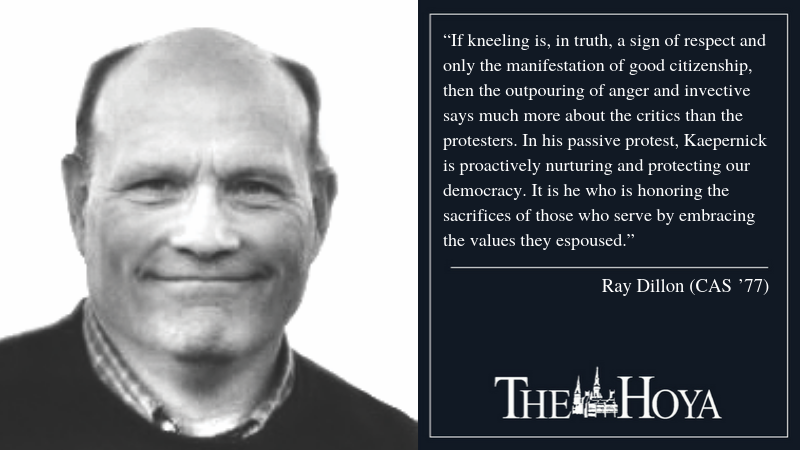On Sept. 1, 2016, then-San Francisco 49ers quarterback Colin Kaepernick kneeled during the singing of the national anthem at a football game in protest of police brutality against black Americans. In the two years since, other players have joined the protests, even as Kaepernick has been effectively shut out from the league.
Kaepernick’s critics claim kneeling during the national anthem somehow “disrespects” those who served or continue to serve this nation.
I find this assertion bewildering and unsubstantiated.
The negative reactions — which have come from President Donald Trump, Pro Football Hall of Fame running back Jim Brown and an array of voices within both sports and politics — are based in fear of the undeniable power of a simple and humble gesture. The protest is forceful, but not violent; assertive, but not aggressive. Peaceful and non-confrontational protests can be galling, especially for those wishing to dismiss the opinions of others and who seek to depict those with whom they disagree as unreasonable, unpatriotic and untoward.
According to Mr. Kaepernick, his decision to kneel during the singing of the anthem was an attempt to show more respect to former and current U.S. military members, and was a suggestion of former NFL player and U.S. military veteran of Afghanistan and Iraq, Nate Boyer.
“Soldiers take a knee in front of a fallen brother’s grave, you know, to show respect,” Boyer said in an interview with HBO’s “Real Sports.”
In my experience as the son of a World War II veteran, those who served our country rarely use their combat experiences to tell others how to comport themselves in a civil society.
As a young boy, I recall finding my father’s “captain’s bars,” the military insignia of his rank as an officer in the U.S. Army that had been left out on his dresser. When I asked him what they were, I got a cryptic and mumbled, “nothing.”
On another occasion, I noticed a scar on his arm that was usually covered by a shirt sleeve. He reluctantly told me it was from a shrapnel wound he received while serving as a combat engineer in France. He never spoke of it again. In fact, he assiduously avoided any discussions of the war.
Not until I was much older did I discover I had an uncle I had never met. He was a B-17 pilot whose aircraft crashed while on a mission to Nazi-occupied Europe. I was astonished and perplexed that my father had not spoken of a brother with whom he had been close.
It wasn’t until I was a Foreign Service Officer on a tour in El Salvador during that country’s civil war that I finally had an insight into the attitudes of those who serve. While my time there certainly cannot compare to what those on the front lines endured, I understand now why many do not freely talk about war nor pass judgment on those who did not participate.
The feelings and emotions associated with the memories of being in a war come from a very dark place in one’s soul. Those who have experienced it neither glorify combat nor exalt their role. Instead, they tend to be the ones most reluctant to send our sons and daughters into another conflict.
These Americans didn’t enlist for the symbolism of a flag or to advance some jingoistic and shallow nationalism that seeks to elevate the United States above other nations. They were motivated by the ideal of duty to country without the expectation that someone else should bend to their opinions or owe them for their service. Their struggle was for the freedoms on which this democratic republic was founded. They fought, bled and died so that others — such as Kaepernick and his fellow protesters — would enjoy these liberties. They were giving back to the United States, not seeking to impose their will or viewpoints on others.
This purpose is embodied in the concept of “civic virtue,” which applies to us all. We are obliged to exercise those civil liberties others fought to preserve — not as “privileges,” but rather as things we must do.
If kneeling is, in truth, a sign of respect and only the manifestation of good citizenship, then the outpouring of anger and invective says much more about the critics than the protesters.
In his passive protest, Kaepernick is proactively nurturing and protecting our democracy. It is he who is honoring the sacrifices of those who serve by embracing the values they espoused.
Raymond Dillon graduated from the College of Arts and Sciences in 1977. He is an opinion contributor to The Hoya.














